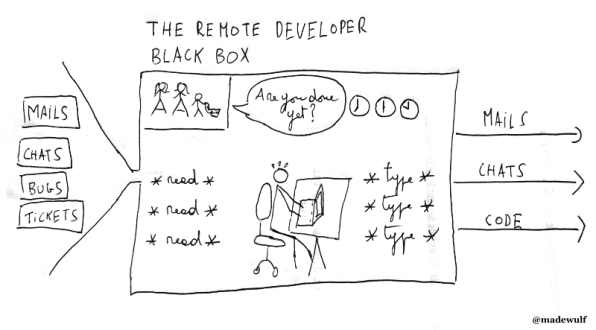I’ve Worked Remotely For 5 Years, And It’s Stressing Me Out
In software engineering, remote working makes a lot of sense since, most of the time, you only need a computer and an internet connection to perform your duties. There are fewer reasons to force people to sit in an office every day. As a result, it’s become an important feature of a lot of IT jobs, even here in Belgium–which in my experience isn’t always the most forward-looking job market–where remote work is common for at least a couple days a week.
I’ve been working remotely for a little more than five years now, and it doesn’t come without stress. I think it’s taken a toll on me over the last couple years in particular, especially when I went almost fully remote for a year, from June 2016 to June 2017. In that period I’ve sometimes felt like I existed in a “remote-developer black box”:

Here are some of the biggest downsides to that experience.
It’s Hard To Communicate
Communication tends to stick to structured channels when you work remotely: the chats, daily standups, maybe a few global meetings every other week, Jira for the tasks and bug reports, and lots and lots of emails.
This works well to accomplish structured tasks, but it’s easy to feel disconnected sometimes. The fact that most of this communication happens in written form or in front of groups makes them unsuitable for small talk or more informal information sharing. And it can hamper your work, as just chatting about the general atmosphere at work can deliver important information about the smooth progress of projects. Worse, it can prevent you from feeling like part of a community.
In addition, written exchanges are more prone to misinterpretation, even with people you know very well. Plus, if you already spend your day typing on a keyboard to accomplish your technical tasks, it’s annoying to have to communicate in written form, too; you end up feeling like a text-processing machine. I began to miss the coffee chats that I’d previously thought to be unproductive wastes of time. I felt detached from the team, especially when the teams I worked with were made of people working in the same place (and seemed to be having fun).
It Causes Interruptions And Multitasking
When working remotely as a developer, chat platforms (usually Slack or HipChat) quickly become your lifeline; that’s the way most people contact you. And to me, being responsive on chat accomplishes the same as being on time at work in an office: it creates an image of reliability. If you don’t want to give the impression that you’re taking a lot of breaks, you might find yourself checking your notifications during lunch, for example. Whereas had people seen you working the whole morning, or had you just talked face-to-face with your coworkers by then, you wouldn’t feel the need to be so responsive. I’ve noticed other remote colleagues get criticized for not answering quickly by chat.
Since people don’t see you physically, they can’t really judge if it’s a good moment to interrupt you. So you get interrupted a lot, and if you’re like me, you feel forced to answer quickly. So you interrupt your own work a lot (programmers in particular tend to loathe this, since it saps their productivity and breaks their focus).
The other problem with remote chat is that people don’t know whether you’re already speaking with somebody else. I can’t count the number of times I’ve been juggling three different conversations at the same time, which to me can become stressful, especially when I have tasks to finish by the end of the day.
There are often “leisure” chats as well, about non-work stuff (usually a lot of memes), which can become very, very chatty. To keep my sanity, I mute these chats most of the time, but when you come back, catching up on everything that was said can be a daunting task, even though it may be my only opportunity to take part in the “office spirit” I’m missing by being a remote worker.
It Encourages Overwork
Most jobs come with at least two types of obligation:
- Obligations of results, where you commit to give a certain result by a given date. Typically for a developer that means completing a sprint with a given set of bugs/features to develop by a certain deadline.
- Obligations of means, where you mainly commit to spending some of your time every day on your work, and you just deliver the results you’ve managed to produce within that time.
I’m not naïve, and I know that in the end (especially in software engineering), most jobs are really about results–you’ll get fired if you produce nothing–and not means. But since people can’t see you work remotely, you might feel more obliged to show results every day, even if it forces you to work way past eight hours a day. I can’t count the number of times a configuration problem or a customer call took a few hours of my day, but I still felt forced to finish the task I’d committed to that day, just so nobody could assume I was slacking off instead of working. Had my coworkers seen me in front of my computer all day, I probably would’ve felt relaxed enough to finish it that task later.
This instinct has led to two things for me: being really appreciated for the reliability of my output, and being seriously overworked. According to Basecamp CEO Jason Fried, this is “the true challenge of managing remote workers: People who work too hard.” In the end, it comes down to the question of trust: My employer trusted me a lot, allowing me to work on my own terms, and in exchange I’ve always felt compelled to work a lot more than if I were in an office.
It’s Challenging Being A Stay-At-Home Dad
When you spend a good part of your time at home, your family sees you as more available than they sometimes should. Even if you have places dedicated to work that should be off-limits to your kids, it’s still tempting for them to come ask you “just a little something.” It’s hard to expect children to compartmentalize their home–actually, it’s hard for me, too.
This can make video calls a bit stressful. You’re talking with a customer for example, and your kids end up just appearing behind you on video. Remember this?
Farewell 2017. Thank you for giving us this. ???? pic.twitter.com/tIUAzNnIUU
— BBC (@BBC) December 31, 2017
I also know some people have problems resisting the need to perform home duties, like cleaning the kitchen. This has never been too much of an issue for me, but it’s created tension with my wife from time to time, since it was difficult for her to understand how I could’ve left a dirty dish on the dining room table all day while I was actually at home. (Answer: I was working and avoiding interruptions . . . )
It Can Feel Lonely
Working at home can mean a lot of loneliness. I do enjoy being alone quite a lot, but even for me, after two weeks of only seeing colleagues through my screen, and then my family at night, I end up feeling quite sad. I miss feeling integrated in a community of pairs.
Interacting on social networks might help you fight that loneliness a little, but the experience isn’t different enough from working on your computer. Plus, it’s also well-known that spending a lot of time on social networks tends to make you less happy than the opposite. Eventually, I really started to hate being alone; it began to impact my mental health and my mood (another well-documented phenomenon).
Working Outside Your Home Has Drawbacks
One of the most common ways to fight this is to work in coworking spaces. But I find them a mixed bag; they cost real money (which your employer might agree to pay, or not) and often ask for time commitments (usually at least a month). They can create social environments and work opportunities, but at the risk of feeling a bit too much like a vacation camp, with activities every day (cooking, massages, meet-ups) designed to force people to socialize. I actually found myself going to coworking spaces only when those events weren’t scheduled–and gave up going altogether rather quickly, since it seemed pointless to use a coworking space to avoid loneliness only to not talk to anybody.
Commuting to a coworking space takes time, and when you’re there, you may work with headphones all day to avoid distractions, barely taking breaks (because you lost time commuting), and feeling awkward for not taking advantage of the community. As an added problem, video calls are more difficult to do in these settings, since there’s not much space to be alone, always a bit of noise, and the risk you’ll annoy people in earshot (or you have things to say that you don’t want them hearing).
Working remotely outside my home–whether in a coworking space or not–sometimes means not knowing where I’ll be working every day, and it’s stressful having to think about which hardware I need to take with me (keyboards, DVI adapters, chargers). Coffee shops are usually a bad idea, at least for full days: there’s too much noise, and I don’t like feeling obligated to buy something to eat or drink periodically to justify my presence.
Obviously, when you work remotely you don’t leave your workplace at night. And if your coworkers are in different time zones, you end up communicating a lot after your workday is over (I did that for months when working with people based in New York or San Francisco). It often makes sense; otherwise you might have few chances to speak with your team, which can really slow down projects, but it means there’s little time free of work-related concerns.
Finally, working at home doesn’t leave time to cool off while coming back home from work. For me, the ideal commuting duration is 15–20 minutes. That gives you some time to walk (which means at least some physical exercise) and change your thoughts a bit. Many evenings, I’d go from a video meeting to a family dinner in 30 seconds, making it hard to offer my kids my full attention.
It Comes With Unforeseen Costs
If you want to gain responsibilities over time, working with limited visibility can be a problem. At one employer I felt that people in the office were preferred for promotions. To be sure, working remotely over the last few years has been a boon to my family while our kids were small. It made it possible for my wife and me to pursue our careers with minimal hassle, since I was more available to take care of the kids when they were sick (which happens a lot in their infancy). And while that meant catching up on work in the evenings and weekends, I appreciated that flexibility.
Remote working also allowed me to join high-quality teams I wouldn’t have found in my local job market. So while I’m still a fan of remote work, it really took a toll on my mental comfort sometimes, which has impacted my family relationships–mainly just through my own irritability. In my experience, remote work can cut you off from the human interactions that make all those work-related tasks feel meaningful. Ultimately, for all its benefits, I don’t like being in the remote-developer black box.
A version of this article originally appeared on Hacker Noon, how hackers start their afternoons. It is adapted with permission.
Fast Company , Read Full Story
(28)







